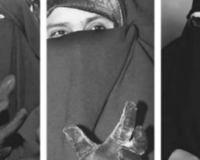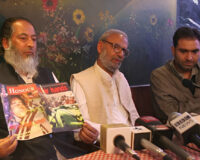In 1947, Great Britain partitioned its South Asian colony India, into two new independent countries: ‘Hindu’ India and ‘Muslim’ Pakistan. The status of Kashmir being princely independent state remained disputed between India and Pakistan. Like East Timor, Kashmir’s international legal status is uncertain. It is unclear whether Kashmir today exists as part of India, Pakistan or both. Again, similarly to East Timor, the Security Council has outlined the right of self-determination to the Kashmiri people through an independent plebiscite. However, the constant threat to peace that exists in Kashmir serves as a hurdle to achieving this right. In East Timor, the Security Council pursuant to its powers under chapter VII of the UN charter authorized an International Force for East Timor (interfet) to preserve the freely expressed will of the people. Threats to international peace are arguably greater in Kashmir than they were in East Timor. India and Pakistan have fought three wars over Kashmir, and the nuclear capabilities of both countries add to the dangers of elongating any chances for peace.
The population in occupied Kashmir are fighting ‘War of liberation’ for their right of self-determination against colonial domination, alien occupation and against racist régime of India, which has forcefully occupied and annexed the territory of Kashmir hence it is termed as International Armed conflict (IAC) under common article 2 to four Geneva Conventions and Additional protocol 1.[1] India although has not ratified Additional Protocol 1 but applying the rule of Jus Cogens India is bound to restrict it actions with rules set forth in these protocols. In addition, India is bound by ICCPR to grant the right to self-determination of people of Kashmir.[2]
Human Rights Groups have uncovered in Jammu and Kashmir the detention of numerous persons held by military and paramilitary forces in long term unacknowledged detention and interrogation centers, and transit camps intended only for short-term confinement. Human rights activists fear that many of these unacknowledged prisoners are subjected to torture and some killed extra-judicially. There were attempts to restrict International human rights organizations and monitors from visiting Kashmir for investigative purpose.[3]
The Government of India invoke ‘Black Laws’ to detain the Kashmiris who stand for their fundamental rights. It is a violation of international law for a state to attempt to criminalize the struggle of peoples to achieve self-determination. According to the authoritative United Nations Resolution 2625 (XXV) of 1970: “Every State has the duty to refrain from any forcible action which deprives peoples …of their right to self-determination and freedom and independence”, and Resolutions 33/22 and 33/24 (1978) which condemn the imprisonment and detention of people fighting colonialism. Those peoples legitimately struggling for national liberation are not to be treated as criminals, but must be afforded the status of political prisoners and Prisoners of War under the Additional Protocol I to the Geneva Convention.
Amnesty international and others have acknowledged how Indian forces have committed summary executions of Kashmiri civilians with total impunity. Atrocities such as shootings into unarmed crowds of demonstrators and firing on funeral processions occur regularly, despite the prohibiting of arbitrary deprivation of life under any circumstances under International human rights law. The government of India is a party to the International Covenant on Civil and Political Rights (ICCPR). Article 6 of the ICCPR expressly prohibits derogation from the right to life. Thus, even during times of emergency no one shall be arbitrarily deprived of his life.[4] The ICCPR also prohibits torture and other forms of cruel, inhuman and degrading treatment. Articles 4 and 7 of the ICCPR explicitly ban torture, even in times of national emergency or when the security of the country is threatened.[5] The Indian armies special task force (STF), Border security force (BSF), and state sponsored paramilitary groups and village defense committee – the principal government forces operating in Jammu and Kashmir,[6] have systematically violated these fundamental norms of international human rights law.
05th August 2019 when Indian Parliament unilaterally abrogated the limited autonomy of Jammu Kashmir state the entire population were placed under military siege, in order to avoid any political dissent or street protests. The abrogation of Article 370 in parliament inaugurated a conversion in the state’s response from shooting to kill and maim protesters, to a period of nocturnal raids, searches and cordons, mass arrests, and illegal and incommunicado detentions, particularly under the Public Safety Act, 1978 (PSA). PSA, a preventive detention law that allows for the jailing of individuals through executive authorization by administrative officials, rather than judicial body following a judicial due process of law or fair trial.
The preventive detention of political prisoners under the Act is by far the most well-known and documented aspect of its operations; in fact, it defines and proscribes three different kinds of dangers to ‘public safety’: dangerous places, dangerous ideas and documents, and dangerous individuals.[7] Sections 3 and 4 deal with ‘Protected’ and ‘Prohibited’ place, which provide for penalties of imprisonment without trial for a period of three months and six months respectively, for unauthorized persons entering into or ‘loitering’ in notified areas. Section 6 empowers the state to prohibit the entry and circulation within the state of Jammu and Kashmir of any document ‘likely to affect the public order’, while Section 8 deals with the detention of ‘certain individuals’.
Kashmir is often referred to as one of the ‘Hostile conflict region’, given that it is the world’s largest militarized conflict zone, with a dangerous place for those who fight politically or by any other mean to liberate the territory. Post 05 August the occupied territory in particularly has become dangerous place for those who contest its forcible incorporation into the Indian republic. According to Amnesty International, estimates of the numbers of persons detained under the Act over the past two decades range from 8,000-20,000. These include all mainstream Politicians who contest or are perceived to contest Indian action over forcible annexation of territory – whether it is human rights activists, Lawyers, pro Liberation activist or ‘stone pelter’, who throws stones at the armed men who enforce Indian rule.
Total 13,000 people had been arrested in occupied Jammu and Kashmir after abrogation of Article 370 on Aug 5, 2019. India has released a large number of detainees but hundreds are still in custody under Sections 107 and 151 of the Criminal Procedure Code, the Unlawful Activities (Prevention) Act (UAPA), and the Public Security Act (PSA), both controversial laws were used against political prisoner to cripple their liberty.
A truly healthy society is one where all enjoy fundamental rights. When the entire globe reels under the pandemic COVID19. The government of India fails to provide adequate health care and preventive measures where the Kashmiri political prisoners are lodged. Not only this, in late March India’s Supreme Court recommended that the government begin granting parole to Indian prisoners in a bid to stop the exponential spread of the corona virus pandemic in the country’s overpopulated prisons, however this did not include Kashmiri political prisoners. The Government of India announced parole to harden criminals but no such relaxation was given to Kashmiri political prisoners who are detained for demanding their fundamental right i.e. Right of self-determination. The political detainees incarcerated during this pandemic disease include Bar Association Head and other political leaders. Few of them are; Advocate Mian Abdul Qayoom. Shabir Ahmad Shah,Muhammad Yasin Malik, Altaf Ahmad Shah,Dr Ashiq Husaain Faktoo, Ghulam Qadir Bhat,Basher Ahamad Bhat ,Raj Mahraju-din-kalwal, Gulama Mohammad Bhat Ayaz Akabar, Farooq Ahamad ,Syed Shahid, Syed Shakeel, , Nayeem Ahamad Khan, Zahoor Ahamad Watali,Shaded ud Islam Ashiq Hussain Faktoo and thousand prisoners languished in different jails. Among these political prisoners, Government of India has detained three female political prisoners namely Asiya Andrabi, Nahida Nasreen and Fahmida Sofi. In such cases, as the PSA order in the case of Masarat Alam, a political leader of the Muslim League held under PSA since 2010, states, the state sees ‘preventive detention [as a] very effective tool against the persons having potential, will, commitment and urge to challenge the integrity and sovereignty of the state.’ He is facing the continuous 38th Detention order which makes him the first political prisoner of history who is being detained for more than 26 years without fair trial.
The detention of political prisoners through these ‘Black Laws’ is an example of how the law in occupied Kashmir is a tool of war for targeted assaults and low-grade continuous warfare. It allows for the creation of a complete, complex, self-enclosed, and socialized carceral system a system of collective, indefinite punitive containment with no exit, where the process is quite literally the punishment. The state creates a political buffer zone, coercing and blackmailing families and the recalcitrant and striking population to actively engage with its institutions – the local extortionate police official, the distant bureaucrat, and the obdurate jailer.[8].
The pandemic has piled pressure on criminal justice systems globally and has led to a flood of prisoner releases worldwide as the rate of transmission of COVID 19 is higher insider prisons because of the conditions of detention, which often have inadequate ventilation, are overcrowded, and have weaker health systems. On 5 April 2020, UN Secretary-General Antonio Guterres called for a “very close look” at the continued incarceration of Kashmiri prisoners in Indian occupied Kashmir amid the growing cases of the deadly corona virus.[9] However, India has adopted COVID 19 as a new tool of repression on political prisoners. These political detainees are being hounded purely for their political belief.
Unfortunately, sometimes ill-treatment, and even torture, occur in places of detention. Six leading international human rights organizations and US department of state jointly demanded immediate release of prisoners amidst the current situation of Covid-19 but it has not been adhered pursuant to Kashmiri Political Prisoners lodged in Different Indian Jails.
Political Prisoners must be treated humanely in all circumstances. They are protected against any act of violence, as well as against intimidation, insults, and public curiosity. IHL also defines minimum conditions of detention covering such issues as accommodation, food, clothing, hygiene and medical care.
The fourth 1949 Geneva Convention and Additional Protocol I also provide extensive protection for civilian internees during international armed conflicts. If justified by imperative reasons of security, a party to the conflict may subject civilians to assigned residence or to internment. Therefore, internment is a security measure, and cannot be used as a form of punishment. This means that each interned person must be released as soon as the reasons which necessitated his/her internment no longer exist.
[1] Common Article 2 four Geneva Conventions, Article 1(4) Additional Protocol 1.
[2] Article 1 , ICCPR
[3]2019 OHCHR Report on Jammu Kashmir
[4]Article 1, Article 6, International Covenant on Civil and Political Rights.
[5]Article 4 states ‘In time of public emergency which threatens the life of the nation and the existence of which is officially proclaimed no derogation from articles 6,7,8 (paragraphs 1and 2),11,15,16 and 18 may be made under this provision.’ International Covenant on Civil and political Rights, U.N. General Assembly Resolution 2200 A (XXI) of 16 December 1966, India became a signatory on April 10, 1979.
[6]The other Security forces deployed in Kashmir, the CRPF and the BSF, have combat duties and sometimes conduct operations jointly with Indian army forces; see more human rights reports 19999(Behind the Kashmir conflict: Abuses by Indian security forces and militant groups continue), http://www.hrw.org/reports/1999/kashmir/; and http://web.amnesty.org/report2004/ind-summary-eng
[7]Shrimoyee Nandini Ghosh, Public Safety Act: The making and unmaking of the Dangerous Individual in Kashmir
by Café Dissensus on February 20, 2017
[8] ibid
[9] Office of the spokesperson for the UN Secretary General available at https://www.un.org/sg/en/spokesperson






